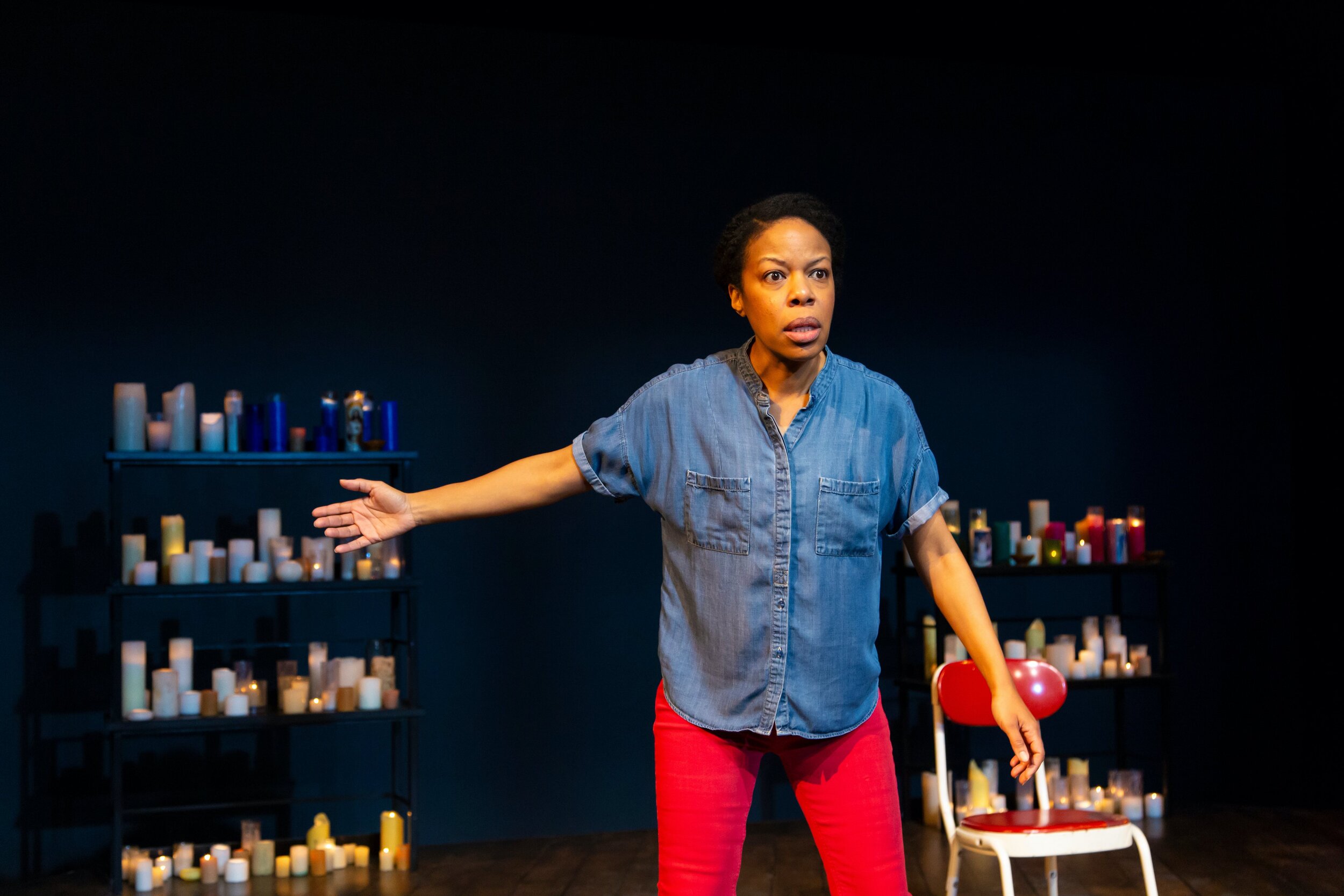Review of Pike Street, Hartford Stage
Character, we might say, is outwardly a question of manner and inwardly a question of one’s openness to others. By such a measure, Nilaja Sun’s Pike Street, at Hartford Stage through February 2, directed by Ron Russell, is full of character.
Nilaja Sun in Pike Street, at Hartford Stage (photo by T. Charles Erickson)
All of its characters, enacted by Sun, the author and performer of the play, are manners she adopts at will, carrying on vivid dialogues, and Sun’s openness to others is what makes the play work. She is able to inhabit these folk because they aren’t just figments of her imagination: they are people who live a precarious existence on the Lower East Side of Manhattan, an existence made perilous by the imminent arrival of a hurricane. The backstories come to light as necessary to fill us in on the situation, but the main gist is the way the impending crisis brings out the character in these characters.
Evelyn is a Puerto Rican mom, beset by the fact that her daughter Candi, fifteen, has suffered an aneurysm that leaves her confined to a chair and in need of a respirator and a dialysis machine—and, with yet another major storm on the way with its possible attendant loss of electricity, Candi is at risk. The family, which includes Evelyn’s truculent and womanizing father, Poppi, played mainly for laughs, should evacuate to a shelter, says Con Ed, but moving Candi in her chair up and down five flights with no elevator is no picnic, and the kind of callous treatment the girl suffered last time—during Hurricane Sandy—leaves Evelyn loath to endure such indignities. Her solution: a generator in the apartment should they lose power.
Nilaja Sun in Pike Street, at Hartford Stage (photo by T. Charles Erickson)
Other characters come and go to flesh out the proceedings, particularly Evelyn’s brother Manny, just now returned from service in Afghanistan and the source of the income the family manages on. Manny is generally an ingratiating and agreeable sort—except when indeterminate triggers set off his PTSD, making him apt to cause some havoc with local Arab merchants. Neighbors, such as senile Mrs. Appelbaum, Ty, Manny’s pot-smoking chum, and Migdalia, Poppi’s woman-for-hire, add voices and occasions for reactions, as Evelyn tries her best to be staunch and patient like her deceased mother was—a healer who ran a botanica now closed.
Sun’s sure way of conjuring these characters opens their world to us and us to their world. One of the show’s more memorable moments is when a flashback lets us see Candi, as a child, campaigning for class president and sounding like a font of wisdom.
Nilaja Sun in Pike Street at Hartford Stage, photo by T. Charles Erickson
Before the show begins, Sun sits on the set’s lone chair, shelves of candles behind her, as the audience enters, seeming to commune within herself. She opens the show by reaching out to the audience, inviting rhythmic handclaps interspersed with deep breaths, as not only a way of focusing our attention but a way of making us all alert to each other and to the transformative possibilities of her story. Being present is key to the show’s message, showing how important the cohesion of this family—any family—is, while also hitting the audience with a tragedy that comes from the everydayness of bad decisions and bad luck.
The show’s final, indelible image is of the most at-risk character’s resilience, which is also in its way a cry for help. Nilaja Sun’s Pike Street finds its passion and its humor in the trials and joys of living and creates theater that feels—in our storm-stressed times—like a humanitarian effort.
Nilaja Sun in Pike Street, at Hartford Stage (photo by T. Charles Erickson)
Pike Street
Written & performed by Nilaja Sun
Directed by Ron Russell
Scenic Design: Mikiko Suzuki MacAdams; Costume Design: Clint Ramos; Lighting Design: Tyler Micoleau; Sound Design: Ron Russell; Production Stage Manager: Molly Minor Eustis; Assistant Stage Manager: Nicole Wiegert; Production Manager: Bryan T. Holcombe; General Manager: Emily Van Scoy
Hartford Stage
January 9-February 2, 2020



